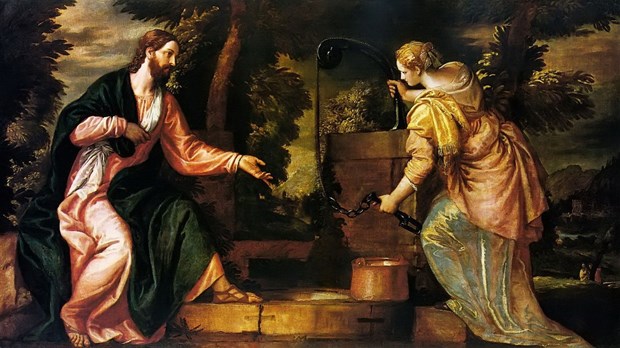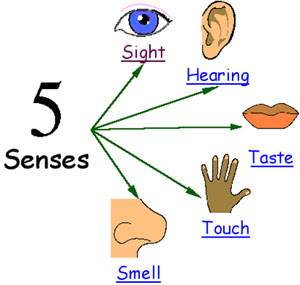
[I could not resist reposting this – the original may be found here with a number of great comments!]
The Gospel for the third Sunday of Lent offers a special little gem for the classically minded church-goer. As Jesus is speaking to the Samaritan woman at Jacob’s Well, He tells her that the water in the well will only bring a limited satisfaction.
Whosoever drinketh of this water, shall thirst again; but he that shall drink of the water that I will give him, shall not thirst for ever: But the water that I will give him, shall become in him a fountain of water, springing up into life everlasting. The woman saith to him: Sir, give me this water, that I may not thirst, nor come hither to draw.
I am no Scripture scholar, but it’s clear to me that the water that Our Lord is speaking about here is not some kind of physical or sensible water. He is not speaking about H2O. He is clearly referring to something else; something like the waters of Baptism. Or perhaps he is referring to the gift of faith itself under the figure of water. It is through Faith that the believer springs up to life everlasting.

The Samaritan woman does not necessarily understand this, but nonetheless desires this special water. But then Our Lord makes this rather strange request:
Jesus saith to her: Go, call thy husband, and come hither. The woman answered, and said: I have no husband. Jesus said to her: Thou hast said well, I have no husband: For thou hast had five husbands: and he whom thou now hast, is not thy husband.
My knowledge of the customs of the Samaritans is limited. How is it that the woman at Jacob’s well had five husbands? Perhaps each husband successively died? Either that or this woman was a sort of scriptural pre-cursor to Elizabeth Taylor?

In addition, the shocking revelation of the number of husbands that this Samaritan woman has had sort of covers up what appears to be a strange request by Our Lord in the first place. Why does he say “Go, call thy husband”? Why do we suddenly need the woman’s husband?
But the answer to this particular question is not quite as interesting to the hearer as the simple revelation that this woman has had five husbands!
It’s not everyday that one meets a man who has had five wives, much less a woman who has had five husbands!
I confess I find it scarcely credible that anyone could have that many spouses.
Now I remember that when interpreting scripture one is always supposed to start with the literal meaning. The other figurative meanings have their foundation in the literal meaning.

So I am ready to simply take Our Lord’s word for it that this woman did in fact have five husbands. She, on the other hand, appears to be very impressed by His knowledge of this and immediately says,
Sir, I perceive that thou art a prophet.
And later she tells her fellow townspeople,
Come, and see a man who has told me all things whatsoever I have done. Is not he the Christ?
So, again, I suppose we need to simply assent to the simple fact that the Samaritan woman has had five husbands. Perhaps her husbands were each a little like the water in Jacob’s well; stagnant, dull and unsatisfying. Hence she keeps going back to the “well” to draw up another one.
But I don’t think we should be satisfied with only the literal meaning of the Gospel in this instance. Five husbands are just too unusual to let it pass that easily.
Here are two figurative accounts of these five husbands that I find very satisfying.
The first is explained by the Catholic apologist Gary Michuta who points out the fascinating fact that the Samaritan woman’s “matrimonial history” has an uncanny “parallel in the religious history of Samaria” itself .
Samaria was once part of the northern kingdom of Israel, which had broken off from the Davidic Kingdom…The king of Assyria brought pagans into Samaria to settle there (1 Kings 17:24).
Interestingly enough, 1 Kings 17:30-31 tells us there were five groups that settled there, each worshipping their own pagan gods: The Babylonians worshipped Marduk; the men of Cuth worshipped Nergal; the men of Avva worshipped Nibhaz and Tartak; the men of Sepharvaim worshipped their city gods; and King Hadad worshipped Anath.
Even though the Israelites were joined in covenant to the one true God, they intermarried with these foreigners and adopted their worship and practices. This is why the Jews wouldn’t have anything in common with Samaritans — because their assimilation with these pagans had defiled them. Samaria, like the woman at the well, had five husbands and was estranged from her true husband.
Now this is very revealing! Scales are falling from my eyes!
It makes abundant sense that Our Lord was referring to these false gods as husbands. How often does Our Lord compare his relation to the church through the image of the bridegroom? Christ is the husband of His bride the church. So of course, the five husbands might fittingly refer to Samaria’s unfortunate “marriages” to five false gods.
For our second figurative interpretation let us turn to Saint Augustine. It was through reading his book On the Interpretation of Scripture , that I first gained a sense for the many layers of wisdom contained in the Scriptures. It was there that I learned the principle rule of interpretation, namely the “rule of charity.” Scripture should not be interpreted in a way that contradicts any other part of Scripture. Or more positively, we ought to be open to reasonable interpretations of scripture as long as they do not contradict other doctrines or interpretations that have already been set forth. Additionally, if I remember correctly, Saint Augustine seems to have a particular fondness towards making sense of numbers in scripture. I know there are some who downplay numbers in the Bible – and I suppose many get carried away with their numerological interpretations – but if examining numbers seriously in scripture was good enough for Augustine, then it is also good enough for me!

So here is what Saint Augustine says about the five husbands (among other things).
Jesus seeing that the woman did not understand, and wishing to enlighten her, says, Call your husband; i.e. apply your understanding. For when the life is well-ordered, the understanding governs the soul itself, pertaining to the soul. For though it is indeed nothing else than the soul, it is at the same time a certain part of the soul.
Now that is a shock isn’t it? Saint Augustine appears to be suggesting that the rational ability that we have, the understanding, is fittingly called “husband” by Our Lord.
I am certain that Saint Augustine meant no offense with his reference to the understanding as the husband. I think he means something like what St Paul said when he says,
But I would have you know, that the head of every man is Christ; and the head of the woman is the man; and the head of Christ is God.
The head, of course, is often associated with thinking and I think it is safe to call it the seat of the understanding. Is that a safe assertion?
And so we needn’t dismiss Saint Augustine’s interpretation as merely an interpretation coming out of the patriarchal mindset that he undoubtedly had inherited through no fault of his own.
Rather it would appear, according to Saint Augustine, that beyond any actual husbands that the woman had, he was more concerned with the “husband” that is none other than the understanding part of the woman’s soul. Call that husband.
But more importantly,Saint Augustine gives us an insight into the nature of the human soul. The “well-ordered” soul might be seen as a sort of marriage between the understanding part of the soul and the soul itself. In other words, the soul might be said to have a part which governs, and this part we call the husband.
He continues:
And this very part of the soul which is called the understanding and the intellect, is itself illuminated by a light superior to itself. Such a Light was talking with the woman; but in her there was not understanding to be enlightened.
It seems to me that there is a sort of proportion here. As the understanding governs and instructs a person, so too should Christ Himself govern and instruct the understanding.
In other words, Christ is the bridegroom of the soul. Christ is the husband of the understanding soul.
Our Lord then, as it were, says, I wish to enlighten, and there is not one to be enlightened; Call your husband, i. e. apply your understanding, through which you must be taught, by which {you must be} governed.
![]()
And now you are thinking, “What about those five husbands?”
Without missing the cue,Saint Augustine responds,
The five former husbands may be explained as the five senses, thus: a man before he has the use of his reason, is entirely under the government of his bodily senses. Then reason comes into action; and from that time forward he is capable of entertaining ideas, and is either under the influence of truth or error.
We are either under the governance of our reason, or under the governance of our senses. The senses of course, in a broader sense, also include the so-called sensitive appetites otherwise known as the passions or the emotions.
We are either governed by our reason or by our passions.
And so our understanding soul, that which ought to govern, is called “husband” by our Lord. But when we are ruled by our appetites, then we have unsatisfying and even “dull” husbands. The senses are not quite as keen as the intellect. No wonder we would marry one after another.

And when Our Lord says,
“and he whom thou now hast, is not thy husband.”
He now refers to an even worse husband than the dull senses or passions. He is referring to the “husband” who is Error. Error might be called an “adulterer”, because the understanding soul ought to be wedded to the truth, the understanding soul ought to be wedded to Christ.
It clearly follows what Saint Augustine says next:
The woman had been under the influence of error, which error was not her lawful husband, but an adulterer. Wherefore our Lord says, Put away that adulterer which corrupts thee, and call your husband, that you may understand Me.



